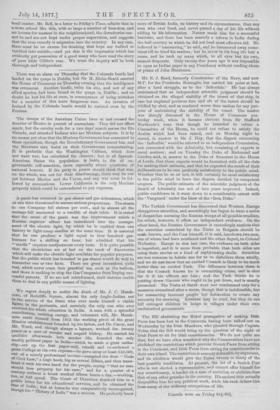The Turkish Government has discovered that Western Europe disapproves atrocities,
and accordingly has begun to issue a series of despatches accusing the Russian troops of all possible crueltiee, for which, however, it offers no independent evidence. On the other hand, the Russian Government is exceedingly anxious that the atrocities committed by the Turks in Bulgaria should be mite known, and the Czar himself, it is said, has shown two men, one of whom had been mutilated and the other flayed, to Colonel Wellesley. Except in this last ease, the evidence on both sides is imperfect, and it is more than probable that both sides are using these stories as a kind of asphyxiating shells. Atrocities are too common in Asiatic war for us to disbelieve them wholly, and we do net know that an excited Cossack is likely to be much better than an excited Turk. The difference between them is that the Cossack knows be is committing crime, and is shot for it if his officers see him ; and the Turk thinks he is putting down Giaours who ought to be put down, and is usually promoted. The Turks at Battik were not condemned only fora massacre committed after a storm, though that is indefensible, but for massacring innocent people too defenceless to create any necessity for storming. Russians may be cruel, but they do not kill outraged children in heaps in villages under their own undisturbed government.


































 Previous page
Previous page